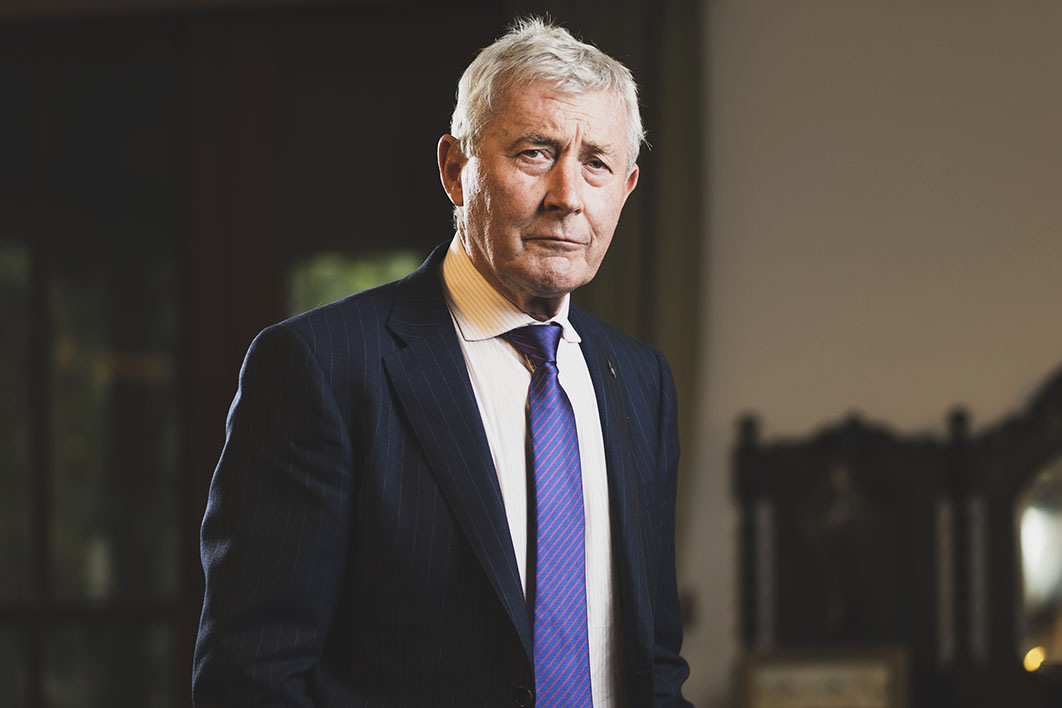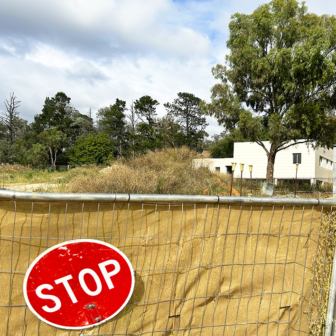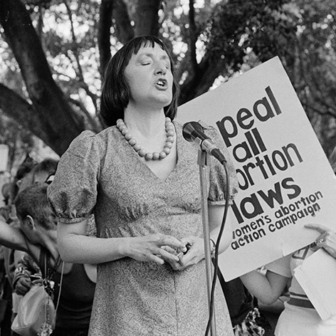When attorney-general Mark Dreyfus canned the long-running prosecution of Canberra lawyer Bernard Collaery he was praised widely by critics of Canberra’s national security culture. Five months later, the praise is tempered by puzzlement: a subsequent legal move by Dreyfus may block efforts to answer lingering questions about the long-running case.
Collaery, a former ACT attorney-general, was charged with having breached secrecy laws when he revealed that the Australian Secret Intelligence Service had bugged Timor-Leste government offices in 2004. At the time, Australia was negotiating a maritime boundary straddling a rich natural gas field in the Timor Sea. Also charged was one of Collaery’s clients, a former ASIS officer known as Witness K.
When the case eventually went to trial, Justice David Mossop accepted the Coalition government’s argument that much of the evidence needed to be kept from the public, and some of it even from Collaery himself, to protect national security. But a three-person bench of the ACT Court of Appeal, including the territory’s chief justice, overturned Mossop’s ruling.
Before the court could publish its reasons, Dreyfus’s predecessor, Michaelia Cash, directed the government’s most senior legal officers to seek to have the ruling overturned by the High Court, with a stay on the decision in the meantime. Otherwise, Cash’s lawyers argued, information “likely to prejudice national security” would be made public. Open justice was of “undoubted importance,” they said, but national security considerations had to be given “the greatest weight.”
That argument was received sceptically by chief justice Susan Kiefel and her High Court colleagues. Justice James Edelman asked solicitor-general Stephen Donaghue if the ACT chief justice’s error was merely that she “did not make the order that you sought.” Offered a choice between having the application thrown out or having the stay left in place, Donaghue opted for the latter.
Dreyfus’s termination of the prosecution left the status of the ACT Court of Appeal’s ruling unresolved. Surprisingly, he then asked the court to reconsider its decision to allow the contentious evidence to be made public. The ACT’s new chief justice, Lucy McCallum, heard the application in September, and her decision is now awaited.
The Human Rights Law Centre’s Kieran Pender, who has followed the Collaery case, says it is “very unusual” for the government to try to “relitigate” the Court of Appeal judgement. “Given the question of redactions has already been determined once by the Court of Appeal, and the government has withdrawn the High Court appeal, to attempt a second go at the Court of Appeal is remarkable.”
Instead, says Pender, “the attorney-general should get on with dropping the outstanding prosecutions of whistleblowers David McBride and Richard Boyle and reforming Australia’s lacklustre whistleblowing laws. Whistleblowers should be protected, not prosecuted in secret trials.”
Collaery believes the Albanese government is “encased” by the same circle of security advisers, in and out of the public service, who orchestrated the moves against Witness K and himself. But he can see why Dreyfus might have accepted advice against publication from ASIS director-general Paul Symon, a retired army general and former head of defence intelligence.
“When you’ve got an ex-warrior, albeit with no actual experience in the trade — when you’ve got a man of that eminence and decency, which he has, advising you that publishing the Collaery case would prejudice national security, you accept that advice,” Collaery tells me. “But it’s tripe. It was khaki dressage.”
Beyond the court actions themselves, many influential figures are incensed that responsibility for the murky chain of events stretching back to 2004 could remain unresolved.
Among them is the president of the International Commission of Jurists in Australia, John Dowd, a retired NSW Supreme Court judge and former state Liberal leader. In a letter to prime minister Anthony Albanese on 17 October he called for a royal commission looking at whether ASIS’s bugging operation broke Australian law, whether the secret service was deployed for private commercial gain, whether the national security claims for secrecy are valid, and whether Collaery and Witness K should be compensated.
Not surprisingly, Collaery also wants a royal commission. It should encompass not only the ASIS operation and its propriety, he argues, but also issues of “utter, utter treachery” he says he isn’t at liberty to discuss. Before he was charged, Collaery had security clearance to handle a range of sensitive legal issues involving intelligence agencies and personnel — the very reason why Witness K was originally referred to him for advice in relation to his misgivings about having led the Dili operation.
Collaery particularly wants a fairer outcome for Witness K, who was given a three-month suspended sentence in June last year for conspiring to reveal classified information. He contrasts the treatment he and K received with the kid-glove handling of senior ASIO and other Canberra officials who were exposed as having been compromised by the KGB when the Soviet intelligence agency’s chief archivist, Vasili Mitrokhin, handed over a vast trove of secret records following his defection to Britain via Estonia in 1992.
“We never compromised any national security,” says Collaery, “but those who did and were exposed after Vasili Mitrokhin took the stuff to Estonia were just left alone. Not even dishonourably discharged. And allowed to keep their medals and decorations and all the rest.”
Moreover, Collaery adds, “K was never a whistleblower, despite the media constantly calling him that. If anything he was leading the charge as a mutineer. And for good reason, and he wasn’t alone. The reason why they brought it down on us was to stop L, M, N, O, P, Q [from going public]. So the story’s not told.”
On the face of it, a royal commission should appeal to the new government. It could sheet home the duplicitous Timor-Leste dealings to Coalition leaders at the time of the bugging, notably prime minister John Howard and foreign minister Alexander Downer, and perhaps also other members of the cabinet’s national security committee (which would have included treasurer Peter Costello, attorney-general Philip Ruddock, defence minister Robert Hill and immigration minister Amanda Vanstone).
Yet the idea appears not to have seized Albanese — if the ICJ letter ever got to him. As his department’s acting first assistant secretary for national security, Philip Kimpton, wrote to Dowd, “We are not aware of an intention by government to pursue such a course of action at this time.”
A Labor figure knowledgeable about foreign policy issues explained why the government might be wary about looking into the 2004 spying incident. “Did it continue?” the figure asks, clearly mindful that similar intelligence-gathering activity might well have been going on under the Rudd–Gillard government.
Canberra’s fixation on securing the big undersea gas deposit now known as Greater Sunrise goes back to its first discovery in the late 1960s. Diplomacy, legal argument and espionage were harnessed to negotiate maritime boundaries with Indonesia, Portugal, Indonesia again, and Timor-Leste with the aim of bringing as much of the gas field as possible into Australia’s economic zone. This push by successive Coalition and Labor governments extended over decades.
The Witness K revelations started emerging under Labor, which continued to uphold the boundary negotiated by Downer (with help from the ASIS operation) between 2004 and 2006. It was not until 2018 that Timor-Leste, having had Downer’s 2006 border agreement nullified because it wasn’t negotiated in good faith, convinced an arbitration court at The Hague to endorse a new agreement that moved the border to the middle of the Timor Sea and gave Timor-Leste 80 to 90 per cent of the revenue from Greater Sunrise.
If a royal commission isn’t on the horizon, Albanese and Dreyfus may have opened another avenue for inquiry by creating the new National Anti-Corruption Commission. Susan Connelly, the Josephite sister who fought hard for a median-line boundary and strongly backed Collaery and Witness K, is one who has signalled a reference to the NACC.
This would put targets on the backs of Downer, who later accepted a consultancy from the leader of the Greater Sunrise consortium, Woodside Petroleum, and the late Ashton Calvert, who as secretary of Foreign Affairs supervised ASIS at the time of the bugging and on retirement became a director of Woodside. But the NACC legislation has an escape clause that allows the attorney-general to declare an investigation to be against the national interest.
Foreign minister Penny Wong seems to hope that focusing on practicalities will shift attention away from this rancorous past. In October she appointed former Victorian Labor premier Steve Bracks to broker agreement on developing Greater Sunrise. Bracks’s extensive post-political advocacy for Timor-Leste includes work on the maritime boundary.
Getting the gas field into production has become a matter of urgency for the government in Dili, which has been dipping into its Petroleum Fund — its sovereign wealth fund derived from oil and gas revenues — at an unsustainable rate. The last revenue from existing oil fields will flow into the fund at the end of this year.
If the current rate of withdrawal is maintained, the fund will run down to zero over the next decade. By 2034, according to the country’s finance ministry, Timor-Leste faces “a fiscal cliff” that will necessitate a “radical cut in all spending.” Using similar language, the World Bank has referred to an “inescapable macro-fiscal cliff in the next decade.”
“Timor-Leste is a petro state without much petrol,” says the respected Dili-based think tank La’o Hamutuk in a recent report. The government’s policies “continue to be based on blind faith that, because oil money has carried the country thus far, it will continue to do so indefinitely.”
Politicians in Dili follow former prime minister Xanana Gusmão in pushing for Greater Sunrise to be connected by pipeline to Gusmão’s Tasi Mane scheme. Forecast to cost US$15–20 billion, this complex on the island’s south coast would include an oil refinery, LNG plant, offshore gas and onshore oil pipelines, and a supply base for offshore petroleum projects, along with transport infrastructure and new towns.
Woodside Petroleum and many oil industry experts say the proposed pipeline is too risky. It will need to traverse the 3000-metre-deep, steep-sided, unstable Timor Trench between the gas field and the coast. Other analysts say its revenue and employment benefits have been wildly exaggerated by Tasi Mane’s proponents. Dollar for dollar, investing in coffee production could create six times as many jobs and six times as much GDP growth per dollar as investing in Tasi Mane, says one recent study.
The alternatives to the Greater Sunrise pipeline would be a floating LNG plant, or a connection to existing pipelines in the Timor Sea to transport the gas to Darwin for processing. Timor-Leste would still get most of the revenue but would need to stump up far less capital and would avoid the risk of pipeline failure. Australia might be seen to be getting an undue share of the benefits, though, despite its perfidy.
In September newly elected president José Ramos-Horta tried to pressure Canberra into overruling Woodside’s objections by threatening to bring in China to take over the project. Although China’s banks are reported to have already turned the project down as unfeasible, a Chinese state oil firm is said to maintain a permanent desk inside the office of Timor-Leste’s tiny state oil firm, TimorGAP. Xi Jinping, the Chinese leader, has not always put economics ahead of political-strategic factors.
TimorGAP, meanwhile, has released selected passages from a report by British oil industry consultants ERCE claiming that the running costs of the Tasi Mane and Darwin processing options are much the same. TimorGAP is still refusing to release the full 130-page ERCE report, says La’o Hamutuk, despite Ramos-Horta saying, on his Canberra visit, that this would be helpful.
Adelaide consultancy EnergyQuest says it would be far more productive for all parties to be talking instead about plate tectonics. The Indo-Australian plate is moving north at seven centimetres a year, meaning it would move 1.5 metres over the life of the project. “Building a pipeline [to Timor-Leste] subjected to the full force of one of the most rapid tectonic plate movements in the world is an idea that should never have got off the ground,” says EnergyQuest.
But the country’s successful independence struggle left a complex legacy. “In 1999, Timor-Leste ousted the Indonesian occupiers in defiance of ‘experts’ around the world who told them it would never happen,” wrote La’o Hamutuk’s Charles Scheiner in the recent report. “In 2018 they transcended ‘expert’ advice again, coercing Australia to agree to a fair maritime boundary.”
As a result, says Scheiner, “some Timorese leaders, especially veterans of the independence struggle, now believe they can accomplish anything, regardless of physical or economic realities.” That means Steve Bracks has his work cut out if he is seeking to pierce what some call a “mystical” belief in the pipeline — especially if, as seems likely, pipeline-proponent Xanana Gusmão returns as prime minister after next May’s election.
But Bracks may emerge as an envoy to Canberra rather than to Dili, persuading the Australian government to detach Woodside Petroleum from its lead position in the Greater Sunrise consortium, perhaps through a buyout, and let Timor-Leste take the running and the risks. Woodside has already written the value of its 33 per cent stake down to nothing and has plenty of other projects to keep busy with. Continuing to run Woodside’s case makes Australia look selfish and colonialist, say critics.
Bracks’s ability to persuade would be strengthened if Canberra showed any contrition over the spying and lack of good-faith negotiations — by holding a royal commission or other review, by apologising, and by rejoining the jurisdiction of the International Court of Justice on maritime boundaries, from which Downer withdrew Australia in 2002.
The current limbo is far from satisfactory, says Bernard Collaery. “All it does is leave Australia’s great moral issue in ambiguity.” •




